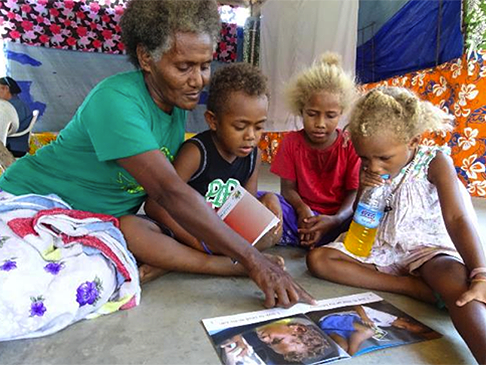Impact stories
Effective education can contribute directly to poverty reduction, economic growth and stability. In the Solomon Islands, UNICEF is working to increase access to quality early childhood education and improve the quality of teaching and learning for primary school children, thereby improving school readiness, enrolment, learning and retention rates.
The project focuses in the Guadalcanal province, one of the most vulnerable in the Solomon Islands. Figures show that it has the lowest net enrolment in primary and early childhood education. Only 62% of teachers in the province hold a certification, meaning that they are the 4th lowest in the nation for qualified teachers. The lack of suitably qualified teachers and inadequate instruction materials, combined with low levels of parent-community involvement were key barriers to improved primary education outcomes.
The project provides tools and training for early learning teachers and community facilitators. In 2016-17, it reached more than 200 families with children under the age of five. Wilco Gideon, a kindergarten teacher, was among twenty Early Childhood Education (ECE) teachers and community facilitators who underwent training last year. The training shows how to use story books and posters to promote a culture of reading as well as increase children's language, social, emotional and cognitive development.
"I've been teaching for over four years now and one of the major challenges has been lack of materials to support my teaching. The few materials I used in my class are mainly produced overseas and feature characters and environments that are very different from Solomon Islands, making it difficult for the children to relate to," explained Mr Gideon. He added that the newly developed books and posters are the first of their kind in Solomon Islands because the children can easily relate to them.
Laisa Bosomete, a grandmother and community elder, who has been very much engaged with early childhood learning in her community, also participated in the training and said parent-community involvement will help ensure more children receive quality education.
"This was an eye opener for me. I've never thought that positive interactions with children could promote holistic development and that children could begin to learn through these interactions as early as 1 year old. My only regret is not knowing these facts when raising my own children but I guess I'll have to do my best now for my grandchildren," she commented.
Supported by the Australian Government through the Australian NGO Cooperation Program (ANCP), the project is being implemented through a partnership between UNICEF, Ministry of Education and Human Resource Development and Guadalcanal Education Authority.

